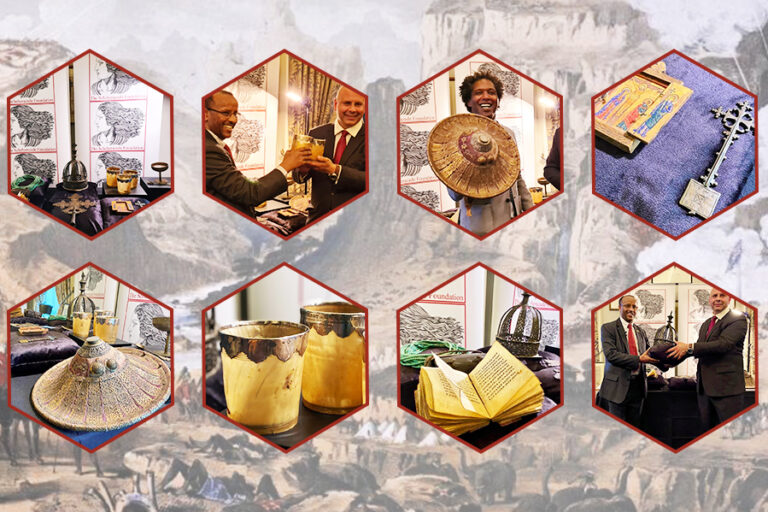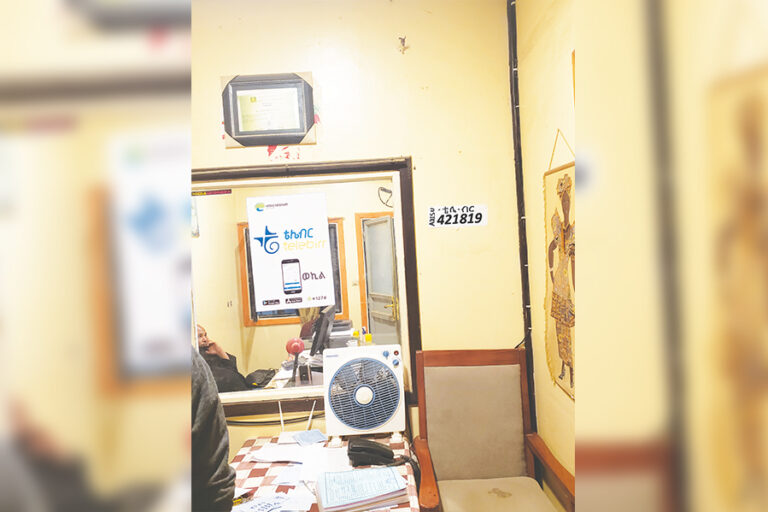Ethiopian artifacts looted during the Battle of Maqdala in 1868 are to be returned to Ethiopia, Ministry of Foreign Affairs revealed.
Ministry of Foreign Affairs, in a press release, stated that the looted Ethiopian artifacts to be returned Ethiopia thanks to The Scheherazade Foundation, who purchased the items through a UK-based auction house and private dealers.
Speaking on the occasion at a reception held at The Athenaeum Club, Ethiopian Ambassador to UK, Teferi Melesse thanked The Scheherazade Foundation for their work in acquiring the precious items and renewed calls for museums, collectors and holders of Maqdala 1868 heritages to return them to Ethiopia.
The Scheherazade Foundation CEO, Tahir Shah said he knew what the return of the objects would mean to Ethiopians. He added that he hopes to build bridges between the two nations through his Foundation.
Alula Pankhurst who is an Ethiopian scholar and social development consultant in his social media account said that the return of the treasures is significant. “The treasure trove of returned looted artefacts by the Scheherazade Foundation to the Ethiopian Ambassador in London at a ceremony at the Athenaeum club in London is the single most significant heritage restitution to Ethiopia both in the number and diversity of the items. These include not just beautiful and symbolic religious artefacts including two crosses, an archbishop’s crown, an icon, psalms of King David and magic scroll, but also a magnificent shield, three unusually large horn beakers, as well as copies and illustrations of letters and publications contextualizing the Magdala expedition of 1868,” he said.
“We are on the cusp of a ‘restitution age’, where the role of museum as custodians of colonial heritage is being questioned and global relations and history of artefacts are being reinterpreted with the potential to bridge cultures and strengthen relations between institutions, scholars and the public at large across nations – nowhere more so than in the case of Ethiopia and Britain with a long shared history, notably during the last Emperor Haile Sellassie’s exile as a refugee in Bath and the role of British troops in Ethiopia’s liberation from the Fascist Italian occupation,” he continued.
“The British state rightfully returned several artefacts including the manuscript of the Glory of the Kings in the late 19th Century at the request of Emperor Yohannes IV, and a crown during the reign of Empress Zewditu to the Regent Taferi on his visit for King George VI’s coronation in 1937, and Emperor Tewodros’ seal and a crown during Queen Elizabeth Visit to the Ethiopia in 1965. In the late 20th Century and early 21st Century individual descendants of soldiers of Napier’s Magdala expedition did the right thing and returned more than 20 artefacts as gestures of popular goodwill taking up the call of AFROMET, the Association for the Return of the Magdala Ethiopian Treasures, and recently the Imperial War Museum returned a lock of Emperor Tewodros’ hair.”
Alula further said that “the cache of returned artefacts in one go is almost equivalent to all the private collection returns over many years in the late 20th and early 21st century, and may pave the way for further restitutions initiatives; especially at a time when retaining artefacts, notably human remains such as those of Prince Alemayehu in Windsor Chapel or sacred objects such as a the holy Tabot Arks of the Covenant in the British Museum, that it has been agreed never to display is becoming increasingly anachronistic, irrelevant and embarrassing. In stark contrast these and other artefacts have immense historical, cultural and spiritual value in the homeland to which they belong and their return results in jubilation and national pride and immense gratitude that a historical wrong has at last been rectified. It is high time that Britain follows the example of the British people and the most recent trail blazing initiative of the Scheherazade foundation ‘Buying Back Better’ and participating in the growing movement for heritage restitution and building global and bilateral cultural bridges and promoting increase mutual respect, understanding and collaboration.”
Looted Ethiopian artefacts during battle of Maqdala to be returned home
Honoring the promise
When Abiy Ahmed come to power about three years ago, the new administration and the former ruling party, EPRDF, had announced that crucial economic reforms would be taken similar to the political openness. The Ethiopian year that ended on Friday September 10 has seen some tangible policy shifts as per the promise despite the effect of COVID 19 on some processes. For instance, the opening up of the telecom sector is the biggest success attained as per the project. Similarly, the ratification of Capital Market Proclamation is the other milestone during the year.
Meanwhile, there are several achievements like export earnings, agricultural productivity and mining sector boom that is expected to take close to one fifth of the GDP for the 2020/21 budget year while inflation, mainly food inflation, has stood as the major macro-economic challenge for the year.
True to the promise of opening up the telecommunication, the biggest deal in the horn of Africa, in the form of the safaricom-led consortium were granted operator’s license for Ethiopia. This will open the door for more fierce competition between Ethio telecom and safaricom as both try to have the upper hand in the telecom service in the country. We hope to see this flourish as the New Year kick starts.
Staying competitive, Ethio Telecom in May this year launched a mobile phone-based financial service, seeking to boost growth by offering cashless transactions. This is because mobile financial services have become a significant part of African telecom operators’ businesses since Kenya’s Safaricom pioneered them with M-Pesa in 2007, giving people an alternative to banks.
The new service, telebirr, will mark a shift for Ethiopia, where the banking system is seen as inefficient with 19 commercial banks serving a population of about 115 million. This financial platform will allow users to send and receive money, deposit or take out cash at appointed agents, pay bills to various merchants and receive cash sent from abroad.
Pictured here is a notification at Koket Borena Hotel, one of the biggest hotels at the Ethio-Kenya border town of Moyale, receiving payments through the newly introduced electronic payment system of the telecom giant, Ethio Telecom’s Telebirr. This is the first step to a cashless society and hopefully we will see these kinds of signs in the rest of the country including Addis Ababa in the coming New Year.
T-Bills continue to mushroom
The volume collected through Treasury Bills (T-bills) mushrooms in the past fiscal year. Since the market determined T-bills auction was introduced government has commenced a one year maturity in the year.
It was recalled that late 2019 the government had introduced bimonthly market determined rate T-bills auction that took place at the National Bank of Ethiopia (NBE) on the aim to attract more players and avoid direct advance it received from the central government.
On the 2020/21 fiscal year that ended on June 30, the net issuance of T-bills with different maturity was about 97.2 billion birr that makes the total outstanding to 121 billion birr.
The debt analysis of the Ministry of Finance stated that the participation of government and private owned commercial banks on the T-bills market showed an improvement compared to the previous quarters and last year. It reminded that T-bills with a maturity of 364 days was introduced and showed improvement in the last three quarters.
The average yield for Treasury bills, which is negotiable securities issued by the government mainly in short term obligations, of 28 days, 91 days, 182 days and 364 days has increased compared to last year same period.
From the total public sector outstanding domestic debt the share of T-bills instrument has also increased since it started on the new scheme and has stood at 10.6 percent at the 2020/21 fiscal year.
At the same time, the share of T-bills for the GDP has stood at 2.54 percent. The main objective of government in introducing the competitive auction on the T-bills was to drop the direct advance and mobilize the resource from potential actors like financial sector and other big investors for the demand it fulfills in developmental projects and also to control the inflation by sacking excess money from the market.
While direct advance for the year has shown slight increment compared with the preceding year but it is still significantly lower compared with the behavior before the economic and political reform that was emplaced about three years ago.
The reason for the sharp drop for direct advance is government’s replacement with treasury bills.
For the year, the direct advance that central government received from NBE is 83.5 billion birr that has a share of 7.32 percent from the total public sector outstanding domestic debt for the 2020/21 fiscal year.
The direct advance share for the total outstanding domestic debt was close to quarter in 2016/17, 2017/18 or 2018/19 fiscal years, which indicated that since the new market based T-bills auction was introduced, it played a major role to reduce the volume that the government secured from direct advance.
In the 2019/20 fiscal year, the government accessed only 31 billion birr, which was 3.4 percent of the total outstanding domestic debt, through direct advance.
Before the introduction of market determined T-bills auction, the stock of old Treasury Bills which was 149.3 billion birr as at December 4, 2019 was converted into the newly introduced treasury notes.
The stock of direct advance which was 192.2 billion birr was also converted into long term bond as of July 7, 2019.






